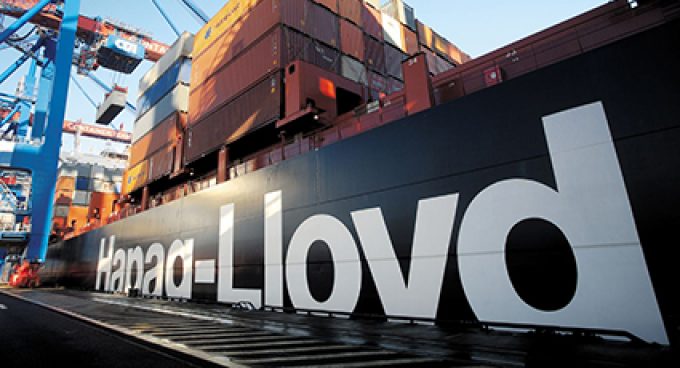Container spot rates have peaked as all major trades see prices fall
There was more evidence in this week’s container port freight markets that peak prices on ...
TFII: SOLID AS USUALMAERSK: WEAKENINGF: FALLING OFF A CLIFFAAPL: 'BOTTLENECK IN MAINLAND CHINA'AAPL: CHINA TRENDSDHL: GROWTH CAPEXR: ANOTHER SOLID DELIVERYMFT: HERE COMES THE FALLDSV: LOOK AT SCHENKER PERFORMANCEUPS: A WAVE OF DOWNGRADES DSV: BARGAIN BINKNX: EARNINGS OUTODFL: RISING AND FALLING AND THEN RISING
TFII: SOLID AS USUALMAERSK: WEAKENINGF: FALLING OFF A CLIFFAAPL: 'BOTTLENECK IN MAINLAND CHINA'AAPL: CHINA TRENDSDHL: GROWTH CAPEXR: ANOTHER SOLID DELIVERYMFT: HERE COMES THE FALLDSV: LOOK AT SCHENKER PERFORMANCEUPS: A WAVE OF DOWNGRADES DSV: BARGAIN BINKNX: EARNINGS OUTODFL: RISING AND FALLING AND THEN RISING

Hapag-Lloyd achieved a record $18.5bn ebit in 2022, compared with $11.1bn the year before – but saw freight rates fall “significantly” in the fourth quarter, alongside a “significant increase in costs”.
Nevertheless, the ocean carrier bucked the trend of declining volumes in Q4, as liftings equalled the previous year’s 2.9m teu, with a full-year total of 11.8m teu, versus 11.9m teu in 2021.
Moreover, the ebit result was right in the middle of the $17.5bn to $19.5bn it advised analysts and investors in early November.
This suggests Hapag-Lloyd’s results were better insulated from the collapse of spot rates in Q4 than some of its peers, due to a higher percentage of its carryings being sourced from the more robust contract business.
The German carrier released its unaudited preliminary results today and will publish its annual report and outlook for the current year on 2 March.
It said that the “extraordinarily strong result” for 2022 “can primarily be attributed to higher freight rates”.
Revenue for Q4 was $8bn, down from $8.4bn in Q4 21, although for the 12-month period, turnover soared to $36.4bn, against $26.4bn in 2021. Hapag-Lloyd’s average rate last year was $2,863 per teu, up 43% on 2021’s $2003.
However, the carrier’s average rate slumped 15% in Q4 on Q3, to $2,625 per teu from $3,106 per teu, as spot market rates plunged and contract rates came under pressure.
And the carrier clearly has concerns about the impact on its bottom line from high charter rates and inflationary price rises from service providers. It said: “Disruptions in global supply chains and inflation have led to a significant increase in costs.”
Vespucci Maritime CEO Lars Jensen said he thought Hapag-Lloyd had done well to maintain its volumes and freight rates against a backdrop of weakening demand, showing “significant resilience in Q4 by holding onto volumes in a declining market and slowing the drop in realised freight rates considerably, compared with the overall market”.
Last week, Hapag-Lloyd announced it had acquired a 40% shareholding in Indian terminal and inland transport provider JM Baxi Ports & Logistics. CEO Rolf Habben Jansen explained: “Terminal and infrastructure investments are a crucial element of our strategic agenda and India is one of our key growth areas.”
A week earlier Hapag-Lloyd had completed its purchase of a 49% stake in Italian terminal and transport Spinelli Group, confirming its Strategy 2023 was to “continuously expand” its involvement in the terminal sector.
Hapag-Lloyd also has agreed to acquire a shareholding in the terminal business of Chile-based SM SAAM and has stakes in the JadeWeserPort facility in Wilhelmshaven, Container Terminal Altenwerder in Hamburg, Terminal TC3 in Tangier and the under-construction Terminal 2 in Damietta, Egypt.
Comment on this article